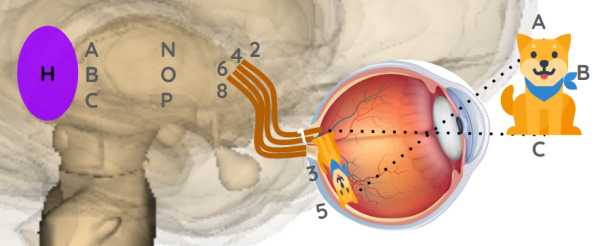The Senses Depend on 6 Circumstances
Table of Contents
33. The senses depend on 6 circumstances.
- The origin of the action originates.
This opens certain tubes into which the spirits first enter.
-
The efficacy and other qualities of that action.
-
The disposition of the filaments composing the substance of the brain.
-
The inequality of strength and efficacy that spirit particles can possess.
-
The different positions of external members.
-
The convergence of multiple actions that simultaneously affect the sense.
For example, if object A, B, C acted on the nose instead of the eye, it would open different tubes in the inner surface of the brain than those noted as 2, 4, 6.

If the object were closer or farther away, it could open the same [optical] tubes.
- But they would be arranged differently.
- This would direct the spirits to different locations than to
A, B, C.
As for the diversity of qualities of the actions that open those tubes, it is also clear that they would open them differently according to their diversity.
This difference alone is enough to alter the course of the spirits in the brain.
For example:
- if object
A, B, C, is brown it will act on the eye1, 3, 5as needed to produce the sensation of the red color. - if that object further has the shape of a cat, instead of a dog, then it will open the tubes
2, 4, 6in a certain way.
This will cause the brain particles near N to press slightly more than usual against each other.
- Those near
Owill move away from each other, so that the spirits entering through those tubes2, 4, 6are directed fromNthroughOtowardsP.
If the object A, B, C were of a different color and shape, those filaments around N and O would not be the cause of the direction of the spirits entering through 2, 4, 6, but other nearby filaments would divert them elsewhere.
However, if the heat of fire A, which is close to hand B, were moderate, the way it opens the tubes 7 is why the parts of the brain around N are pressed, while those around O are slightly more dilated than usual.
Thus, the spirits proceeding from tube 7 would tend from O to P.
If the fire burns the hand, its action will open the tubes 7 so much.
- The spirits flowing into it will have the force to tend further in a straight line than up to
N, up tor, where the pushing brain particles encountered in their transit press them in such a way that they are repelled through them towardsS.